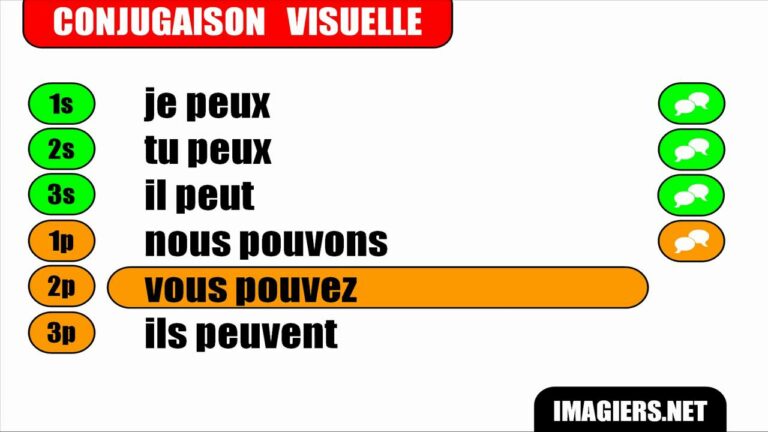The French verb pouvoir means « to be able [to do something], » or more simply, « can » and « may. » It’s an extremely common verb in French and has an irregular conjugation that can be tricky for non-native speakers. For this conjugation, it’s best to learn it by heart.
Ainsi, What is the difference between Penser and Croire?
Penser et croire: penser means to think, croire means to believe, same difference as in English. « penser » would be the logical conclusion of a thought process, « croire » would be based on non-rational faith. Enfin, c’est ce que je pense
What Aller means? Aller means ‘to go.’ Not only is it one of the most common verbs in the French language, but it is also useful to form one of the future tenses within French.
En Bref, How do you use puis in French?
Puis is a conjunction – so used to join related sentences together (j’ai fait les courses puis j’ai regardè la télé).
Et, What is the difference between crois and pense in French? This talk focuses on the French constructions je pense (“I think”) and je crois (“I believe”).
How do you use pense que?
Examples and resources
- Je pense que tu es gentil. I think you’re kind.
- Vous pensez qu’elle chante bien. You think (that) she sings well.
- Ils croient que tu caches quelque chose. They believe you’re hiding something.
- Je crois que mon ami a raison.
- Nous pensons que c’est une bonne idée.
- Elle croit que les anges existent.
How do you use the verb penser?
Penser = to think
I think, therefore I am. Il pense que tu as raison. He thinks you’re right. Pensez-vous qu’elle le sache ?
Do people say puis je?
Asking a question in French using inversion with je is no longer common. Je in inversion is mostly used in formal literature and deep introspection, and sometimes with “puis-je”. If you have to ask yourself something in French, use “est-ce que je”!
What is the difference between ensuite and puis?
In grammatical terms, ‘ensuite’ is an adverb whereas ‘puis’ is a conjunction. As a conjunction, ‘puis’ joins sentences together. That means it cannot simply be shoved at the end of a sentence, which ‘ensuite’ can: “Qu’est-ce qu’il a fait ensuite?” works, NOT “Qu’est-ce qu’il a fait puis?”.
Do the French say puis je?
“Puis-je” – More like ‘might I’ in French
In extremely formal and old-fashioned French, we used to say: “puis-je”.
What does penser in French mean?
The French verb penser is an important word to know because it means « to think. » You will use it quite often when you speak French, so it’s a good idea to study and memorize the verb’s conjugations.
Is Je pense que Subjonctif?
With “Je pense que…” in the affirmative, we don’t use the subjunctive! And “ce + est” = c’est (= “it’s.”) 4. Je ne pense pas que ce soit par là.
Is Je ne pense que subjunctive?
Penser may require the subjunctive, depending on whether it is used affirmatively, negatively, or interrogatively: Par exemple… Je pense qu’il veut aller avec nous.
What is penser in present tense?
See the notes on the conjugation of penser at the end of this page.
penser: Conjugation.
| Present | Perfect |
|---|---|
| je pensai tu pensas il/elle pensa nous pensâmes vous pensâtes ils/elles pensèrent Pronounce these verb forms | j’ eus pensé tu eus pensé il/elle eut pensé nous eûmes pensé vous eûtes pensé ils/elles eurent pensé Pronounce these verb forms |
How do you say tu in French?
How do you invert Il ya?
Note: The only correct inversion spelling is y a-t-il, with exactly two hyphens and no apostrophes. Please avoid y-a-t-il, y-a-t’il , y a-t’il , y a-til, y a til, etc.
Why do French flip words?
Verlan à l’envers is a form of French slang that works, as you might have guessed from the name, by breaking up the syllables of words and reversing them. Verlan was created because civilians wanted a way to communicate with each other without authority figures being able to understand them.
How do you use alors in French?
Alors has several meanings. It can be used to mean ‘then’ or ‘in that case’. For example, Si tu sais conduire, alors tu peux prendre la voiture. (If you can drive, then you can take the car.)
What is the difference between partir and Sortir in French?
With sortir, you emphasize that you’re getting out of something or some place. With partir, you emphasize that you’re leaving for somewhere else.
Can you use Puis at the start of a sentence?
puis is often at the beginning of a sentence. You could have had ‘finalement’ as an end to the story so to speak.
Can I please have in French?
est-ce que je peux avoir l’addition s’il vous plaît?
What does MAI mean French?
noun. May [noun] the fifth month of the year, the month following April.
Is avez vous formal?
vous avez quoi ? is informal, used in speech, with « quoi » at the end (« quoi » never starts a question).
What is the meaning of regarder in English?
1 : an officer having the right and duty under Old English law to inspect the royal forests and ascertain the presence or absence of trespasses or violations of the law.
How do you conjugate voir?
In this lesson, you will learn how to conjugate the irregular verb ‘voir,’ which means ‘to see.
Voir in the Present Tense.
| je | vois | (zhuh-vwah) |
|---|---|---|
| il/elle/on | voit | (eel/ehl/on-vwah) |
| nous | voyons | (noo-vwah-yon) |
| vous | voyez | (voo-vwah-yay) |
| ils/elles | voient | (eel/ehl-vwah) |
How do you conjugate Reflechir?
Conjugate the verb réfléchir:
- je réfléchis. tu réfléchis.
- il réfléchissait. nous avons réfléchi.
- vous réfléchirez.
- ils réfléchiraient.



